Creating a World Together with Babies
Baby Theater : Effortlessly Bridging Age and Language Barriers
Interview with Mana Yumii of the BEBERICA theatre compnay
2025.6.9
【Special Feature 083】
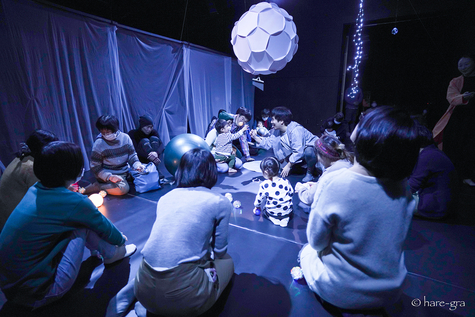
Have you heard of baby theater?(Theatre for early years) This unique form of stage art, which began as a movement in 1980s Europe, is now quickly gaining popularity in Japan, bringing babies and adults together to enjoy performances on stage.
We sat down with Mana Yumii, founder of BEBERICA theatre compnay, to dive into how theatre for early years goes beyond age and language, creating new possibilities for communication and unlocking a world of diversity and inclusion.
Babies are the ultimate and most powerful collaborators
In 2016, Mana founded BEBERICA theatre compnay, which has the theme "Creating a World Together with Babies." Prior to that, in 2015, after a successful career as a stage actress both in Japan and abroad, she experienced a turning point that led her to create and produce numerous performances and workshops through her company.
"My decision to create a company that is focused on theatre for early years was driven by both direct and indirect influences. The direct inspiration came from having performed for three years in Intérieur, a production directed by French theater legend Claude Régy, in collaboration with SPAC (Shizuoka Performing Arts Center). This experience taught me many lessons, but what truly stayed with me was the idea of creating a one-time-only theatrical experience with the audience. The performance required the audience to engage with the actors, cocreating the stage through an intense, shared focus."
Later, as Mana was exploring ways to "create alongside the audience as collaborators, rather than separating them from the stage," she discovered theatre for early years.
"After watching a performance from an Australian theatre for early years company, I thought, "This is it! Babies, as the ultimate collaborators, truly make their presence felt." But there's also an indirect inspiration rooted in my childhood. I lost my mother when I was three, so I don't have memories of her voice or face, but there's one memory that still lingers. I was playing barefoot in a sandbox with my mother when I stepped in dog poop. What I remember most is the sensation of the sand against my feet, the warmth of the poop, and how my mother lifted me up, making me feel like I was floating in the air, followed by the cool splash of water on my feet. Considering I was under three years old, I now realize that I must have felt my mother through my senses. This early experience made me connect deeply with the tactile world of theatre for early years, where babies sense everything around them, and I saw the huge potential in this approach."
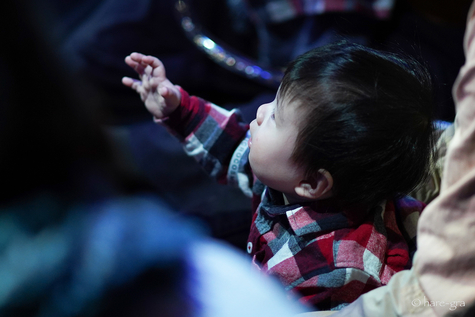
A network where practitioners from across Asia come together to inspire and elevate one another
In the late 1980s, with the adoption of the Convention on the Rights of the Child, a growing movement emerged across Europe to ensure children's cultural rights, sparking the rise of theatre for early years in countries like France, Italy, and Denmark. Japan's approach, however, has taken a slightly different path.
"Around twenty years ago, stage arts for preschool children and their parents began to take shape in Japan, sparked by a nationwide initiative of parent-child theaters. This was in response to the growing need for parenting support and family-friendly spaces--a need that still exists today. By 2016, when I founded my company, there was a growing movement that explored theatre for early years as an art form. Many artists who initially had little interest in working with children began to embrace theatre for early years as a creative outlet after they had become parents. The Children and Families Agency's implementation of the Action for Achieving a Child-Centered Society also likely influenced this shift."
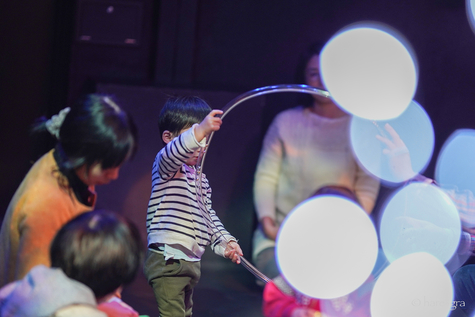
In the summer of 2020, Mana spearheaded the 1st Asia theatre for early years Meeting, a week-long event held at the Kinosaki International Arts Center Residency Program. The gathering brought together fifteen theatre for early years practitioners from Japan, Thailand, Taiwan, Hong Kong, Singapore, and India, creating a dynamic networking opportunity to deepen cross-border understanding of each other's work.
"The purpose of this event was to create a network that connects theatre for early years practitioners across Asia, fostering ongoing collaboration. In Europe, there are already networks of practitioners who gather to learn, challenge each other, and support one another, which includes fundraising for grants. However, no such network exists in Asia yet. During the 2019 International Theater Festival Okinawa for Young Audiences, I had an exciting conversation about theatre for early years with a practitioner from Taiwan. That's when I realized there were no platforms for practitioners in Asia to connect and exchange ideas, and I felt a strong urge to build more opportunities for cross-border dialogue and collaboration."
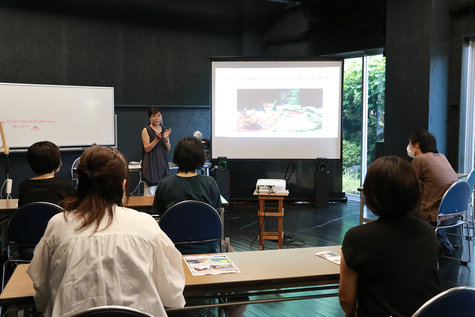
Continuing to explore how theatre for early years can transform art
Throughout the week, fifteen participants connected by sharing their backgrounds and theatre for early years projects. The program included workshops and group sessions where they created short performances, which were then presented at a public event. *Due to the pandemic, domestic participants attended in person after PCR testing, while international attendees joined remotely.
"What surprised me was that many of the international participants were pioneers in bringing theatre for early years to their countries, which highlighted for me that the movement in Asia was still in its early stages. I was also intrigued by how each country's unique circumstances shaped its approach. For example, in India, theatre for early years is seen as an urban concept, hence they purposefully use materials, plants, and dialects tied to rural traditions to showcase things that are slowly disappearing. In Hong Kong, despite the focus on education, opportunities to engage with art are limited, making the chance for babies and parents to experience art together highly valuable. Across all countries, the discussion centered on the artistic impact and social significance of theatre for early years, wrapping up with a shared mission to explore how it can further transform art in the future."
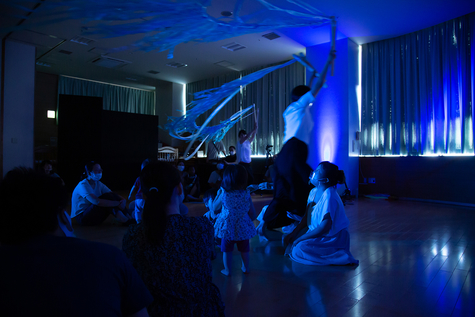
I believe babies have the potential to untangle the social issues that adults have made unnecessarily complicated
Mana has great expectations for the impact theatre for early years will have not just on the art scene but on society as a whole.
"Discovering the world through touch is an experience you can't easily find in other forms of stage art. While the target audience for theatre for early years is often thought to be those with children, I actually want adults--especially those who don't have opportunities to interact with kids--to experience it too, which is why we offer tickets to the public. I believe that immersing oneself in a baby's sensory view of the world offers a chance to rediscover the beauty around us. As I watch a baby's gaze, which gives the impression that they're searching for the essence of things, I think that babies could be the ones to untangle the social issues complicated by adult concerns. Simply observing how babies perceive their surroundings can lead adults to new discoveries, opening up our senses and offering a fresh perspective on both the simple and complex aspects of life. That, I believe, is the artistic ripple effect of theatre for early years."
The power of touch perception, which is how babies learn about their surroundings through their sense of touch rather than words, goes beyond age differences and language barriers. It opens up new possibilities for expression and connection, even in international exchanges, allowing messages to be conveyed through the five senses.
"During the 1st Asia theatre for early years Meeting, a member of a Taiwanese theater company shared a one-minute video from a workshop. It showed an actor singing to a young child, and as the child's expression revealed increasingly deeper emotion, the actor, feeling the shift, continued singing in response. The participant was touched by how communication occurred without words. For me, the true joy of international exchange lies in the ability to connect, whether through language or beyond it, transcending cultural boundaries. I believe that communication with babies embodies this spirit of cross-cultural connection. Although the second meeting hasn't happened yet, a participant from Thailand mentioned, 'Having someone overseas to talk to about what we're exploring, even if it's just trial and error, is a huge support.'"
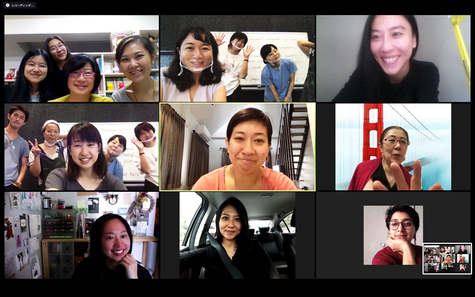
Creating a one-of-a-kind Asian theatre for early years for adults living with children
Following this networking event with Asian practitioners, Mana shares that she is now looking to shape the future of theatre for early years.
"Right now, I'm focused on creating an Asian theatre for early years that's distinct from European-style theatre for early years. While I've learned a lot from Western practitioners, it's become clear to me that our cultural backgrounds are different. A conversation with a participant from Taiwan about their initiative to bring stage art into homes made me realize that in Asia, the connection between children and adults is inseparable. Asian practitioners understand that their work isn't just for children--it's also for the adults who live alongside them. This, I believe, is what gives their work its unique Asian identity. In my company, I encourage adults to experience the performance as if they're seeing it through a baby's eyes. While the Western idea of children having cultural rights is powerful, I want to explore an Asian theatre for early years that brings something new and different to the table."
Uniting practitioners to create a collective force that can drive change in society
In Japan, a new movement is taking shape to unite theatre for early years practitioners and theaters across the country. This includes the creation of the first-ever nationwide network for theatre for early years, the Japan Baby Theater Network.
In 2022, I helped launch the Japan Baby Theater Network alongside seasoned practitioners through the Japan Children's and Youth Theatre Association's theatre for early years Project [https://www.jienkyo.or.jp/project/baby-theater/]. Looking ahead, my goal is not only to expand the recognition of theatre for early years and build a strong domestic network but also to deepen collaborations with practitioners across Asia. While the limited audience size per performance poses economic challenges, I believe that by uniting, we can harness this collective energy to drive meaningful social change.
Profile
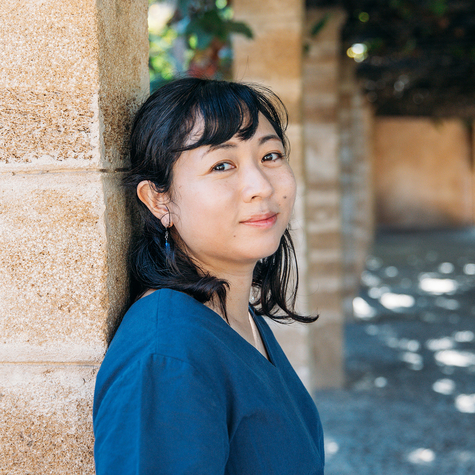
Mana Yumii
Founder of BEBERICA theatre compnay / Director of Japan Baby Theater Network
https://www.beberica.com
Originally from Kyoto, Japan, Mana studied performing arts and theater education at Kyoto University of the Arts and the Za Koenji Creative Theatre Academy. After working as an actor in the productions directed by Claude Régy, she founded BEBERICA theatre compnay in 2016, creating theatre for early years works with the theme "Creating a World Together with Babies."
Mana has produced and directed various performances and workshops with invitations from prominent venues such as the 21st Century Museum of Contemporary Art, Kanazawa; Alios Iwaki Performing Arts Center; and the Ibaraki City Create Center. In 2017, she completed a theater educator's training program in Düsseldorf and was chosen as a member of the Next Generation platform at the ASSITEJ World Congress 2016 (South Africa).
In 2020, she hosted the 1st Asia theatre for early years Meeting at the Kinosaki International Art Center Residency Program. Mana is also dedicated to promoting, researching, and nurturing talent in the world of theatre for early years.
Performance Information
Theatre for early years for both babies and adults: What is Like?
22-24 (Sat-Mon) March 2025, Tsuzuki Ward Culture Center (Bosch Hall)
Keywords
Back Issues
- 2025.11.14 Stories from Both Si…
- 2025.10.24 Dialogue through Ani…
- 2025.6. 9 Creating a World Tog…
- 2024.10.25 My Life in Japan, Li…
- 2024.5.24 The 50th Japan Found…
- 2024.5.24 The 50th Japan Found…
- 2024.5. 2 People-to-People Exc…
- 2024.5. 2 People-to-People Exc…
- 2023.12. 7 Movie Theaters aroun…
- 2023.6.16 The 49th Japan Found…

